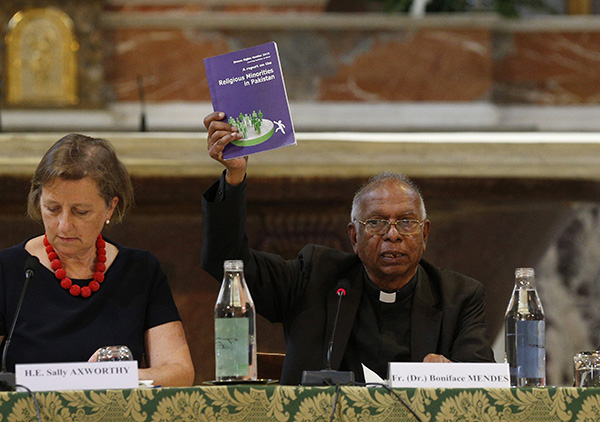
KENSINGTON — Shakeel Rafael’s brother is currently sitting in a jail cell in Lahore, Pakistan awaiting trial on what his family says are phony blasphemy charges.
Nadeem Samson has been behind bars for three agonizing years and his family has mounted an all-out effort to set him free, including asking the U.S. State Department to put pressure on the government of Pakistan.
“My brother is innocent,” Rafael told The Tablet.
“The Catholic Church is providing my brother with legal aid,” said Rafael, who lives in New York and is a member of the Board of Directors of the Pakistani Christian Association of USA.
Pakistan’s blasphemy laws are notoriously strict. Code 295 of the penal law contains three amendments — A, B, and C. Amendment A prohibits anyone from speaking badly about Islam and is punishable by a year in prison. Amendment B makes it a crime to desecrate the Quran and carries a sentence of life in prison. Amendment C prohibits anyone from speaking badly about the Prophet Muhammad, the founder of Islam, and carries the death penalty.
“They use laws to persecute Christians,” said Edward Clancy, director of outreach for Aid to the Church in Need, an organization helping persecuted Christians around the world.
“It is a terrible situation, just terrible,” said William Shahzad, chairman of the Pakistani Christian Association and a parishioner of Immaculate Heart of Mary Church in Kensington.
New York City is home to more than 54,000 Pakistani-Americans, according to the Asian American Federation. Between 2010 and 2015, the population grew by 43 percent. The majority of New York City’s Pakistanis, 45 percent, live in Brooklyn while Queens is home to 39 percent.
Christians are a tiny minority in the Islamic Republic of Pakistan, accounting for only two percent of the country’s 212 million people.
Between the strict blasphemy laws and the political hard-liners who hold a great deal of influence, Christians are afraid to speak their minds, advocates said. Their fears are perhaps well-founded.
Sohail Masih was arrested in Punjab Province on Aug. 5. His crime? A Facebook posting in which he expressed skepticism over the idea of eating the meat of sacrificed animals to wash away sins.
A seemingly innocuous statement can be twisted into something dangerous by authorities. “Under the blasphemy law, there are many, many false cases,” said PCA Secretary-General James Cyprian.
Carol Noreen spent 16 years as a school principal in Pakistan. Christians must be mindful of what they say because you never know who is listening, said Noreen. Neighbors report neighbors to police. Noreen lived in constant fear.
“I was very, very scared,” she told The Tablet. “You can’t say a word, not a single word. If you speak about your Christian faith, you’re in trouble.”
There are Catholic churches in Pakistan, and Sunday Masses draw sizable crowds according to a priest from Pakistan who works in the Diocese of Brooklyn. The priest asked that his name be withheld because he fears for family members still in Pakistan.
“The people are very strong in their faith,” he said.
Blasphemy laws aren’t the only dangers Christians face. A 2016 Easter Sunday suicide bombing, in a park in Lahore, killed 75 people and injured 340. A year earlier, two Catholic churches were bombed.
International Christian Concern, a watchdog group, documented 80 anti-Catholic incidents in Pakistan during the first six months of 2020 and a 2019 British report on religious minorities found numerous examples of atrocities.
Girls as young as 14 are kidnaped, forced to marry their abductors, and then forced to convert to Islam, according to Clancy.
“It is heartbreaking. They seem to target young, Catholic school girls,” he said.
Job discrimination is rampant, said the Brooklyn priest. People who don’t practice Islam don’t get good jobs, even if they have impressive credentials, he said.
Shahzad said the government of Pakistan promised the U.S. government that it will crack down on religious discrimination but “they don’t. And we keep selling them weapons.”
In 2018, the Trump Administration named Pakistan a “Country of Particular Concern,” a designation reserved for nations the U.S. believes have troubling records on human rights.
Secretary of State Mike Pompeo has put pressure on Pakistan to change its ways.
“The department regularly conveys our opposition to blasphemy laws around the world both publicly and privately, and urges the Pakistani government to protect religious minorities and their right to exercise their faith,” a State Department spokesman told The Tablet.
The Pakistani Embassy in Washington D.C. and the Pakistani Consulate in New York did not return messages from The Tablet.
[Related: Asif Pervaiz, a Christian Man, Has Been Sentenced to Death Under Pakistan Blasphemy Law]
